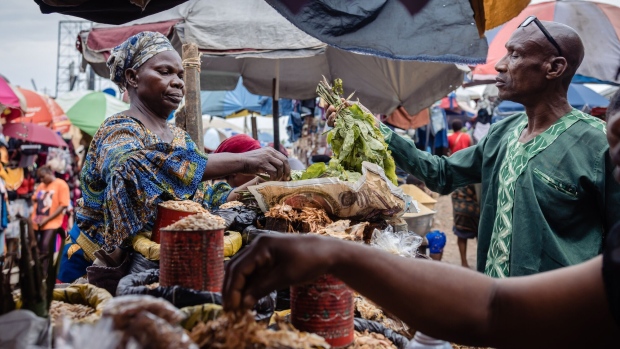Jun 15, 2024
Nigerian Inflation Rate Climbs to 28-Year High on Food Costs
, Bloomberg News

(Bloomberg) -- Nigeria’s inflation rate climbed to a more than 28-year high in May on higher food, rent and transport prices.
Consumer prices rose an annual 33.95%, compared with 33.7% in April, the National Bureau of Statistics said in a report published on its website. The median estimate of four economists in a Bloomberg survey was for 34.1%. Prices rose 2.1% in the month.
Increases in the cost of potatoes, fish and meat contributed to higher food prices. Food inflation quickened to 40.66% in May from 40.3% in April and core price growth, which excludes agricultural produces and energy, accelerated to 27% from 26.8%. An almost 70% drop in the naira against the dollar since June last year also stoked inflation.
Still, some relief may be on the horizon. The country is considering suspending import duties on certain food staples as well as drugs and other essential items for six months to slow inflation and authorities are in talks with labor unions to increase the minimum wage.
Sign up here for the twice-weekly Next Africa newsletter
Also the World Bank approved a $2.25 billion package for Nigeria to stabilize the economy and scale up support to the poor and most economically at risk. The nation has the world’s largest population of citizens living in poverty after India.
The funds will also boost the country’s foreign-currency supply, helping to support the naira.
Bloomberg Economics sees annual inflation peaking at about 35% in the next couple of months, before gradually slowing to around 32% at year-end.
It also anticipates the rate-hiking cycle ending in July. The central bank has hiked interest rates by 14.75 percentage points since May 2022 to 26.25% to rein in inflation and prop up the currency.
--With assistance from Simbarashe Gumbo.
(Updates with core inflation in paragraph three and adds chart)
©2024 Bloomberg L.P.






